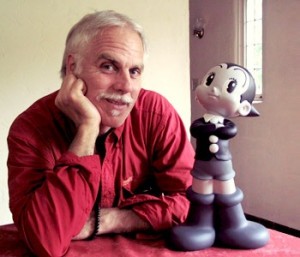Justin’s Japan: Interview with ‘Manga! Manga! The World of Japanese Comics’ author Frederik L. Schodt

“I grew up overseas in several different countries, and I’ve always enjoyed different cultures. And for me, that was exactly the way Japan appeared: it was always interesting, and it still is always interesting. There’s always things to learn.” (Courtesy of Stone Bridge Press)
By JQ magazine editor Justin Tedaldi (CIR Kobe-shi, 2001-02) for Examiner.com. Visit his Japanese culture page here for related stories.
Frederik L. Schodt first traveled to Japan in 1965 as a teenager, and since the early ’80s he has written numerous books about Japanese culture both popular and obscure, including the landmark Manga! Manga! The World of Japanese Comics, the first substantial English-language work on the art form. Schodt also has translated a wealth of books and manga series (many by his late friend, the “god of comics” Osamu Tezuka), and in 2009 he was awarded the Order of the Rising Sun, Gold Rays with Rosette for his contribution to the introduction and promotion of Japanese contemporary popular culture.
Out Nov. 13 is his newest book, Professor Risley and the Imperial Japanese Troupe, the true story of “Professor” Richard Risley Carlisle, an American who introduced the Western circus to Japan in 1864, and in turn gave many Americans their first glimpse of the East when he took his “Imperial Japanese Troupe” of acrobats and jugglers on a triumphant tour of North America and Europe, stirring a fascination with all things Japanese that, Schodt says, eventually led to today’s boom in manga and anime.
In part one of this exclusive, wide-ranging interview, I spoke with Schodt about his fascination with the late 19th century, his relationship with contemporary pop culture icons like George Lucas, and the story behind his middle initial, which is colorfully connected to the events of the film Argo.
It’s been more than five years since the release of your last book, The Astro Boy Essays. What else have you been up to since then?
I’ve actually gone through this and done some rough calculations, but it seems to take me about five years between books. I’ve been doing this same sort of thing that I always do, which is a mix of writing books and translating and then also working as a conference interpreter. For different periods, the weight and the ratio changes, but the mix is pretty much the same. And I’ve been working on the book of Professor Risley and the Imperial Japanese Troupe, I guess, for the last two or three years doing research. But it’s been a lot of fun, I have to say—it’s been one of the most fun books I’ve worked on in a long time.
What are some developments in manga/anime/Japanese pop culture in the U.S. that you feel has moved in a positive direction? At the same time, what things are you a bit critical of in the way they were handled?
I think it’s wonderful that a popular culture from another country such as Japan developed such a large fanbase in the United States, and that was a real surprise to me. I always hoped that people would take more notice in Japanese manga and anime, because I thought they were such an interesting manifestation of popular culture that had been long overlooked in the United States. But I never imagined that both of those entertainment media would become so big and so entrenched in the United States in terms of the fanbase, so that’s been wonderful to see.
It seems like the biggest development in recent years has been the cosplay phenomenon—that’s become a real part of the lingo here now.
That’s right. And I think cosplay in the United States is a little different, and in fact I think the whole fandom in the United States has assumed sort of American characteristics, so it’s developing on its own in new directions, and it’s kind of wonderful to see. I go to some of the larger cons every once in a while, and I really enjoy seeing how young people are interpreting this cultural phenomenon developed in Japan, although I have to say that cosplay is really indirectly inspired by the masquerades and the costume competitions that started in the United States in the sci-fi comic book community. So it’s very interesting. It’s this sort of cultural interchange that I’ve always been fascinated by where you have these two countries that are kind of reflecting each other and sending influences back and forth to each other, and interpreting a phenomenon in slightly different ways.
For the complete interview, click here.


Comments are closed.